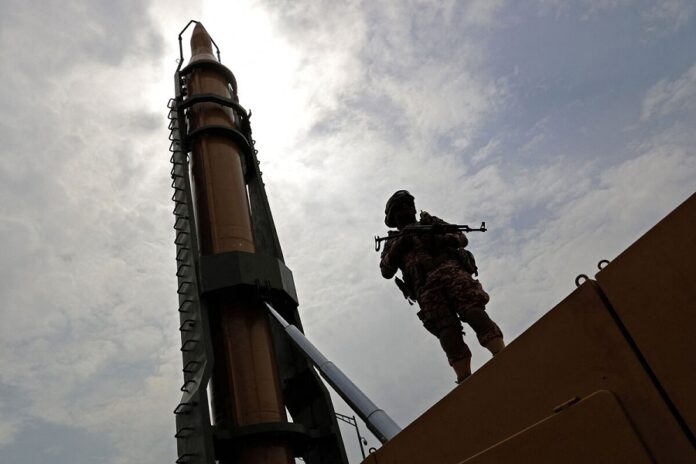China and Russia are in advanced secret talks with Iran to replenish the Islamic Republic’s supply of a key chemical compound used to propel ballistic missiles, diplomats familiar with the matter say, a move that would mark a clear violation of United Nations sanctions and possibly help Moscow replenish its depleted stock of rockets, according to Politico.
Tehran has held concurrent negotiations with officials and government-controlled entities from both countries, including the state-owned Russian chemical maker FKP Anozit, to acquire large amounts of ammonium perchlorate, or AP, the main ingredient in solid propellants used to power missiles, said the diplomats, who requested anonymity in order to discuss confidential information.
In Beijing, Iranian diplomat Sajjad Ahadzadeh, who serves as Tehran’s “technology counselor” in China and the broader region has led the talks to acquire AP, according to the diplomats familiar with the matter. The diplomats said they didn’t know which Chinese companies were involved, however.
The exact quantity of AP Iran is seeking to purchase isn’t clear, but the diplomats familiar with its plans estimate it would be sufficient to build thousands of rockets, including the Zolfaghar missile, which has a range of 700 kilometres and has been used by both Iran and its proxies in the Middle East in recent years. If the deal goes through, some of those rockets could end up being deployed against Ukraine, the diplomats said.
Iran has supplied Russia with so-called kamikaze drones that it has used to attack Ukrainian civilian targets and has also advised Moscow on how to circumvent the international sanctions it faces as a result of its actions.
Representatives for China, Russia and Iran did not respond to requests for comment. Iran’s foreign ministry referred questions regarding Ahadzadeh to the Iranian embassy in Germany, which did not respond. The Iranian embassy in China also did not respond to questions about the diplomat’s activities or make him available for an interview.
The person who answered the phone at FKP Anozit asked for questions to be sent by email. The email bounced. The same person hung up when POLITICO called back seeking to put questions to the company. FKP Anozit does not appear to have a substantial presence as a business, even though the abbreviation FKP in its name means “Federal State Company” in Russian. Its homepage refers inquiries to an industrial marketplace called Techmika.
The talks about procuring AP follow a warming of relations between Iran, Russia and China — which see themselves as a bulwark against U.S. influence — in the wake of Moscow’s all-out war against Ukraine.
Chinese President Xi Jinping, who visited Moscow last month, has stopped short of openly endorsing Russian President Vladimir Putin’s war in Ukraine but has left little doubt that Beijing’s allegiances ultimately rest with Russia.
China, which recently presented a peace plan that critics say would force Ukraine to cede territory occupied by Russia, wants to make sure the Kremlin doesn’t lose the war, amid fears that could trigger the collapse of its neighbor and wider destabilization.
Both the U.S. and Europe have repeatedly cautioned Beijing against offering Russia military support, though it’s far from clear what consequences, if any, there would be if China were to ignore those warnings.
While China has supplied Russia with some military gear in recent months, the support has so far been modest, in part, analysts say, because Beijing is wary of angering its most important trading partners, the U.S. and Europe.


